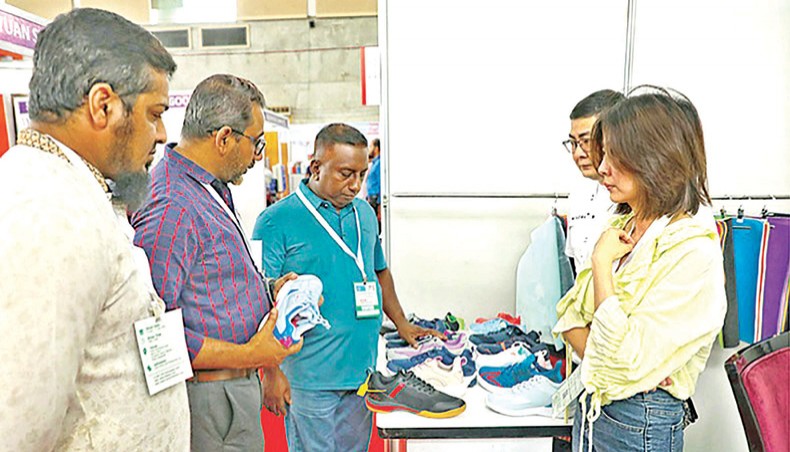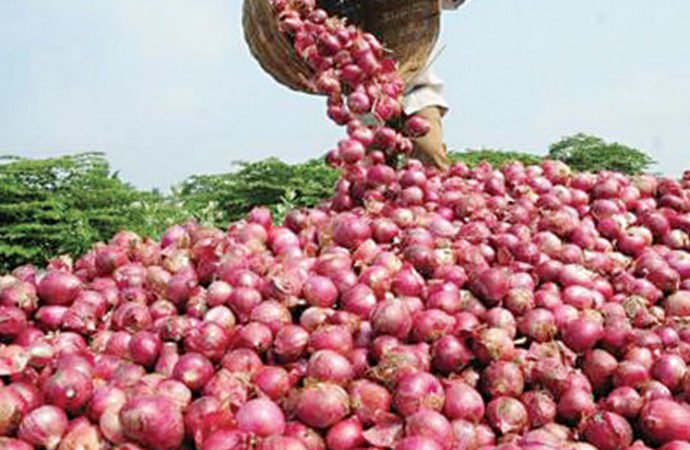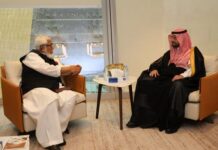
A file photo shows a stall at the Bangladesh Leather and Footwear Expo 2023 in the capital Dhaka. Export earnings from some sectors, including leather and leather goods, home textiles and frozen fish, plunged in five months (July-November) of the current financial year 2023-24 as the demand for such commodities decreased on the global market due to an economic slowdown caused by the Russia-Ukraine war. — New Age photo
Export earnings from some sectors, including leather and leather goods, home textiles and frozen fish, plunged in five months (July-November) of the current financial year 2023-24 as the demand for such commodities decreased on the global market due to an economic slowdown caused by the Russia-Ukraine war.
Exporters said that the exports of leather goods declined due to high inflation in the Western countries and lack of environmental compliance in Bangladesh.
They said that the exports of home textiles decreased significantly as the cost of production increased due to high prices of utilities and yarns.
Exporters also said that the shipment of frozen fish particularly shrimps declined due to high inflation in the European Union and the United states.
According to the Export Promotion Bureau data, export earnings from leather and leather goods in the five months of FY24 decreased by 20.55 per cent to $427.02 million compared with those of $537.50 million in the same period of FY23.
The data showed that the export earnings from leather footwear in July-November of FY24 decreased by 34.75 per cent to $214.15 million compared with those of $328.19 million in the same period of FY23.
Md Saiful Islam, former president of the Leathergoods and Footwear Manufacturers and Exporters Association of Bangladesh, said that the exports of footwear declined due mainly to global economic volatility and lack of environmental compliance of the country’s leather sector.
He said that the Western consumers had received cash incentives from their governments during the Covid-19 pandemic and the demand for leather footwear had increased that time.
To meet the post-Covid demand, buyers placed an increased number of orders, but the ongoing economic slowdown made the Western consumers cautious in buying luxury goods and subsequently buyers also decreased orders, he said.
Saiful, also the president of Metropolitan Chamber of Commerce and Industry, Dhaka, said that environmental compliance issue was the big challenge for Bangladesh leather sector.
He said that environmental compliance was a must for the Savar Tannery State to increase the exports of leather and leather goods.
The government data showed that earnings from the home textile export in July-November of FY24 fell by 42.27 per cent to $299.42 million compared with those of $518.63 million in the same period of FY23.
Bangladesh Terry Towel and Linen Manufacturers and Exporters Association chairman M Shahadat Hossain said that Bangladeshi home textiles lost its competitiveness on the global market due to price hike of gas and yearns.
He said that the price of gas was raised by threefold with a commitment that the industry would get uninterrupted supply of gas, but the government failed to fulfil its promise.
Shahadat said that Pakistan and India were grabbing the global share of Bangladesh’s home textile markets.
He also said that the demand for home textiles decreased on the global market due to high inflation caused by the Russia-Ukraine war.
Export earnings from frozen and live fish fell by 15.88 per cent to $175.19 million compared with those of $208.27 million while the shrimp exports decreased by 23.25 per cent to $120.08 million in the five months of FY24, the EPB data showed.
Bangladesh Frozen Foods Exporters Association president Kazi Belayet Hossain said that both the demand for and the price of shrimps witnessed a drastic fall on the global market due to the Russia-Ukraine war.
‘Amid high inflation, Western consumers are reluctant to consume luxury items like shrimps, but some of our competitor countries are taking the global share of Bangladesh with exporting low-cost vannamei variety of shrimp,’ he said.
Belayet said that the government had just allowed cultivating vannamei shrimp in the country and it would take two more years to regain the global market share with the new variety.
He also said that many of the shrimp factories had lost their competitiveness due to high prices of utilities and a fall in prices of fish on the international market.
New Age









